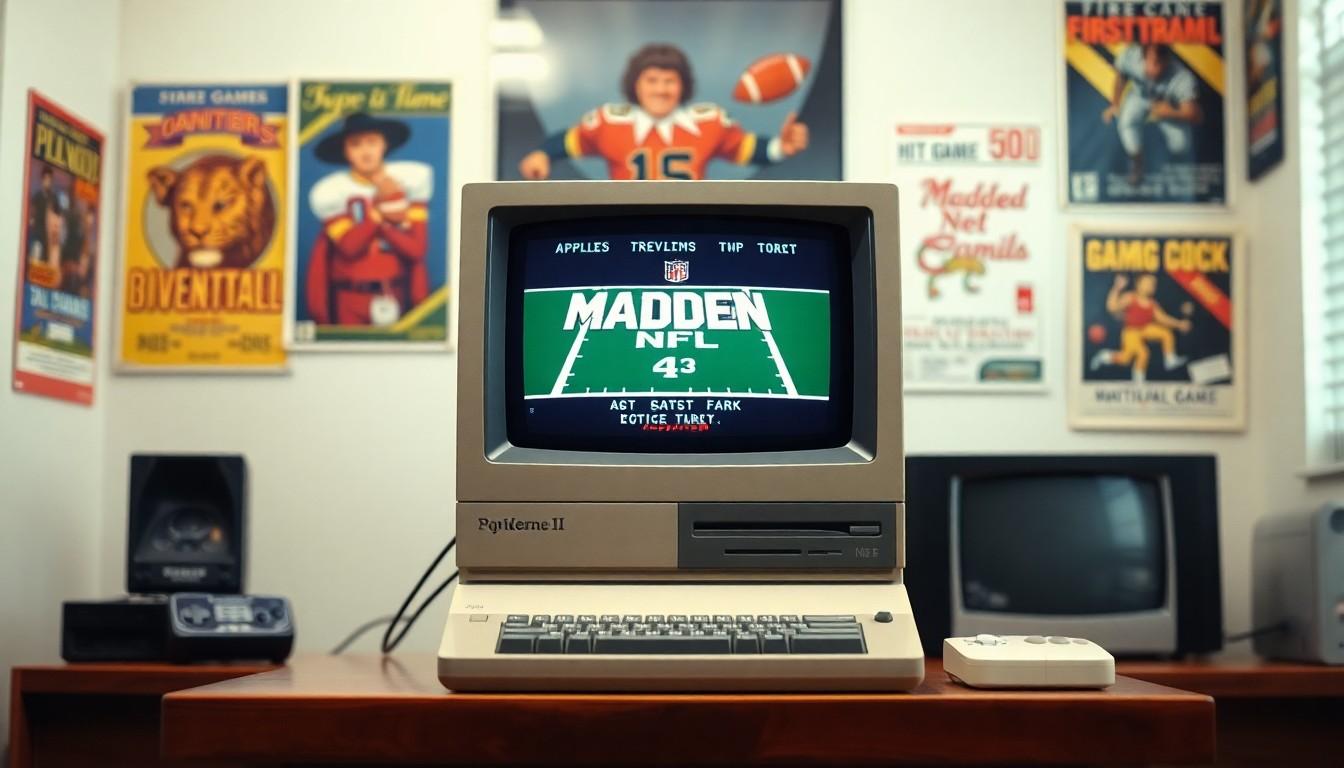In the world of video games, few franchises have left a mark quite like Madden. This beloved football simulation has become a rite of passage for gamers and sports fans alike. But have you ever wondered when it all began? Spoiler alert: it wasn’t just a random Tuesday.
Launched in 1988, the first Madden game hit the shelves and changed the way people viewed sports video games forever. Imagine a time when pixelated players dashed across screens, and the thrill of calling plays was just a joystick away. Fast forward to today, and Madden has evolved into a cultural phenomenon, captivating millions. So grab your controller and settle in as we dive into the history of Madden and discover how it became the titan of virtual football.
Table of Contents
ToggleOverview of Madden NFL Franchise
The Madden NFL franchise began in 1988, marking a significant shift in sports video games. Players appreciated the realistic gameplay and strategic depth, which set it apart from previous titles. The introduction of John Madden as a spokesperson contributed to its authenticity, as he brought real football insights into the gaming experience.
Success came quickly for the franchise. Madden NFL 92 became the first football game to gain sales exceeding 1 million copies. Each release since has introduced advancements, including improved graphics, realistic player movements, and enhanced AI. In particular, Madden NFL 2000 featured the innovative Franchise Mode, allowing gamers to manage teams over multiple seasons.
Online multiplayer options emerged with Madden NFL 2003, significantly expanding its appeal. Competitions and community events like the Madden Championship Series now attract thousands of participants annually. Regular updates keep the gameplay fresh, reflecting current NFL rosters and trends to engage players.
By 2020, Madden NFL became synonymous with virtual football gaming. Its influence extends beyond gaming into pop culture, as it inspired television shows and movies. The franchise’s lasting legacy is evident in how it shaped sports gaming and continues to draw in millions of fans worldwide.
The First Release of Madden NFL
In 1988, the world witnessed the release of the first Madden NFL game. This title marked a significant turning point for sports video games.
Development Background
The creation of Madden NFL originated from a collaboration between Electronic Arts and former football coach John Madden. Initially, Madden envisioned a realistic football simulation that would accurately depict the sport’s strategy and excitement. Developers faced challenges in translating complex football mechanics into a playable format. They focused on creating a game that captured the essence of the NFL while fitting within the technological constraints of the late 1980s. Through perseverance, they laid the groundwork for what would become a groundbreaking franchise, blending engaging gameplay with authentic football experiences.
Release Date and Impact
Madden NFL launched on June 1, 1988, for the Apple II computer platform. Its introduction revolutionized how players perceived sports video games, moving beyond simple graphics and gameplay. This title garnered praise for its strategic depth and user-friendly interface. Soon, it attracted a dedicated fan base, setting the stage for future releases. The game’s success demonstrated the commercial potential of sports video games, leading to further investment in the genre. As a result, the franchise has evolved into a cultural icon in the gaming industry, influencing numerous subsequent titles and generations of gamers.
Evolution of the Madden Series
The Madden NFL series has undergone significant transformations since its inception. Each release reflects advancements in technology and an increasing understanding of football mechanics.
Key Milestones in Madden Releases
Madden NFL 88 marked the franchise’s debut, capturing the attention of gamers with its strategic gameplay. In 1992, Madden NFL 92 became the first football game to exceed 1 million sales, showcasing the franchise’s growing popularity. The introduction of the Franchise Mode in Madden NFL 2000 revolutionized career modes, allowing players to manage teams over multiple seasons. Online play emerged with Madden NFL 2003, connecting players and fostering community events. As of 2020, Madden NFL has sold over 130 million copies, solidifying its place in gaming history.
Changes in Gameplay and Features
Gameplay features have evolved significantly throughout the series. Improved graphics created a more immersive experience, allowing players to appreciate the intricacies of football. Annual updates enhanced player movements and artificial intelligence, making matches more realistic. In 2009, the introduction of the Precision Modifier allowed players greater control over character movements. The integration of Ultimate Team in Madden NFL 10 offered a unique card-collecting experience, blending strategy with player management. Continuous updates have kept the gameplay fresh, ensuring enduring player engagement.
Cultural Significance of Madden NFL
Madden NFL holds a prominent place in the evolution of sports video games. Its arrival in 1988 transformed how gamers interact with virtual sports.
Influence on Sports Gaming
Madden NFL pioneered a new era in sports gaming, setting benchmarks for realism and complexity. Innovations introduced in each version, such as realistic player movements and enhanced artificial intelligence, shaped expectations for future sports titles. The franchise’s emphasis on strategic gameplay resonated with both casual players and hardcore fans, pushing other developers to adopt similar mechanics. As the first sports game to sell over 1 million copies, it established the commercial viability of sports titles in the gaming market. Today, many franchises borrow concepts from Madden, highlighting its lasting influence.
Connection with NFL and Fans
Madden NFL bridges the gap between the NFL and its fan base. Incorporating real player rosters and teams, gamers experience the thrill of NFL matches through interactive play. Community events, such as the Madden Championship Series, foster connection among fans, creating a sense of unity around the franchise. This connection extends to fans participating in deep discussions about gameplay strategies and player performances. Additionally, partnerships with major leagues and endorsements from celebrities further strengthen this bond, ensuring that Madden remains integral to the football culture.
Recent Releases and Future of Madden
Madden NFL 21 marked a significant entry in the franchise, releasing on August 28, 2020. Enhanced gameplay mechanics and new features aimed to attract both veterans and newcomers. Content updates continually improved player engagement, including adjustments to player performance and game balance.
Madden NFL 22 followed on August 20, 2021, introducing the “Next Gen Stats” feature, which utilizes real NFL player data to enhance realism in gameplay. Changes to Franchise Mode allowed players to make deeper management decisions, elevating the strategic component of the experience.
Updates to Madden NFL 23, released on August 19, 2022, focused on refining gameplay and adding features such as FieldSENSE technology. This innovation promotes more realistic football mechanics, providing players with greater control during critical moments. Ongoing support remains crucial, with regular content patches aimed at maintaining the game’s fluidity and competitiveness.
Recurring features maintain Madden’s relevance within the gaming community. Creative modes such as Ultimate Team and The Yard encourage player creativity while promoting online engagement. Competitive esports events like the Madden Championship Series continue to showcase skilled players, contributing to the game’s cultural impact.
Looking forward, future releases aim for further integration of new technologies. Enhancements in graphics and AI are expected to promote a more immersive experience. With fans anticipating the next installment, it remains clear that the Madden franchise will adapt to emerging gaming trends while staying true to its roots in professional football.
Conclusion
The Madden NFL franchise has undeniably transformed the landscape of sports video gaming since its inception in 1988. With each release it has pushed the boundaries of technology and gameplay mechanics while building a strong community among fans. The series not only reflects the evolution of video games but also highlights the deep connection between the NFL and its supporters.
As it continues to innovate and adapt to new gaming trends the future of Madden promises to be just as exciting. With ongoing enhancements and community engagement the franchise is set to remain a staple in both gaming and football culture for years to come.







